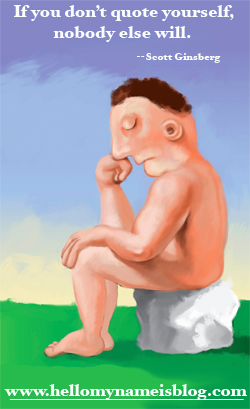 So, you’re pretty smart.
So, you’re pretty smart.
And you’ve said some pretty smart things.
But you didn’t write them down, did you?
Which means you don’t (regularly) quote yourself, do you?
BIG mistake.
LESSON LEARNED: If want other people to quote YOU, you need to quote yourself first.
Because if you don’t quote yourself, nobody else will.
Don’t worry. It doesn’t make you an egomaniac.
It just means that, as a creative professional, as a thought leader, you’re taking ownership of (and protecting) your intellectual property.
Here are a few steps you can take to start quoting yourself today!
1. Pay attention. Sometimes you might say something smart and think, “Damn, that was pretty good!” Or a friend of yours might ask, “Hey, can I quote you on that?” When things like this happen, you MUST recognize them as cues to your brilliance. Because you ARE brilliant.
2. Write it down. The next step is to capture your thoughts. Remember, if you don’t write it down, it never happened! So, the moment you say something brilliant, grab your jotter, a piece of paper, a napkin or your laptop and WRITE IT DOWN. This is the most important step.
3. Verify it. Before you go taking credit for your (supposedly) original thought, be sure to validate it. Start by asking yourself three questions:
a. Is this thought (really) mine?
b. Has this thought passed through the test of my personal experience?
c. How can I discover whether or not this is my own thinking?
If yes, the next step is to google the full, exact phrase in quotations. You need to make sure someone hasn’t already said it, wrote it, claimed it or wrote a book with the title of it. This will help you avoid plagiarism and maintain your originality.
(NOTE: yes, I know, there’s nothing new under the sun. Whatever brilliant thought you’ve had, somebody has probably said it – or something like it – before. But that doesn’t mean they wrote it down. And if it doesn’t exist on google, it doesn’t exist! REMEMBER: Writers keepers, losers weepers.)
4. Store it. Keep a file on your computer or a folder on your desk called, “Smart Things I’ve Said” or “My Quotations” or “Dave’s One-Liners.” Update it regularly with your new quotations.
5. Share it. Now comes the fun part – physically quoting yourself! Here are a few suggestions:
*Create a special report, ebook, whitepaper blog post or video cliff notes that includes all of your quotations. Give it away for free to EVERYBODY. Especially customers, prospects and colleagues.
*Print a few thousand “philosophy cards” that include your ten best quotes. Hand them out to EVERYBODY. For more information on how to create a philosophy card, check this out.
*In your writings, don’t hesitate to quote yourself. Use ownership phrases like, “Like I always say,” “My philosophy is,” and “I like to tell my readers/audience members.”
*In your blog posts, create customized, trademarked images of your quotations that credit your name and URL. This will make it VERY easy for other to quote you. P.S., Take a look at the top of this blog post to see what I mean 😉
6. Monitor and Protect. Finally, get Google Alerts on your best, most frequently used quotations. Find out who’s talking about you, quoting you, and, possibly, who’s stealing your material. Consider buying URL’s, registering trademarks and taking other legal actions to officially protect and copyright your intellectual property. (IF someone DOES steal your material, relax and read this.)
– – –
Now, I know that initially, it might feel odd quoting yourself.
But let’s face it: Ben Franklin, William James, Shakespeare, Emerson and Mark Twain have been quoted enough. The world needs some fresh material.
It’s time for YOU to become the next great thinker.
So, just remember:
If you quote yourself, other people will quote you.
If other people quote you, your perception as an expert and a thought leader will grow.
If your perception as an expert and thought leader grows, you will become more attractive, more approachable and more desirable.
And THAT will galvanize more customers, more opportunities and more business.
REMEMBER: ideas are your major source of income.
If you don’t quote yourself, nobody else will.
And you can quote me on that.
LET ME ASK YA THIS…
What do you “always say”?
LET ME SUGGEST THIS…
Share your best personal quotation here!
* * * *
Scott Ginsberg
That Guy with the Nametag
[email protected]
…only 19 more days until NametagTV.com goes ON AIR!
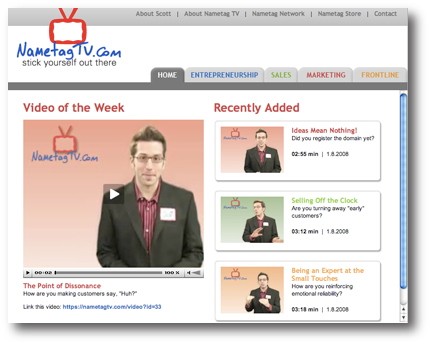


 Need a professional listener?
Need a professional listener? Welcome back, Smithy!
Welcome back, Smithy! Wanna write a book?
Wanna write a book? Are you a Wordsmith?
Are you a Wordsmith? Enjoy this post?
Enjoy this post?
 Enjoy this post?
Enjoy this post? Let’s say you publish one article.
Let’s say you publish one article.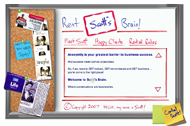 Enjoy this post?
Enjoy this post? A common barrier to putting the pen to the page is:
A common barrier to putting the pen to the page is: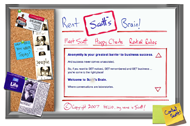 Enjoy this post?
Enjoy this post? You know what’s ironic?
You know what’s ironic?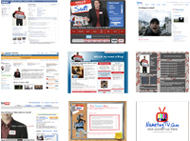 Are you a friend of
Are you a friend of  1. Other creative people keep you accountable.
1. Other creative people keep you accountable.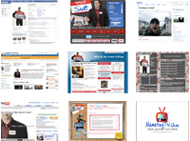 Are you a friend of
Are you a friend of  I hate to say it, but you’re really no big deal.
I hate to say it, but you’re really no big deal.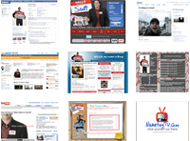 Are you a friend of
Are you a friend of